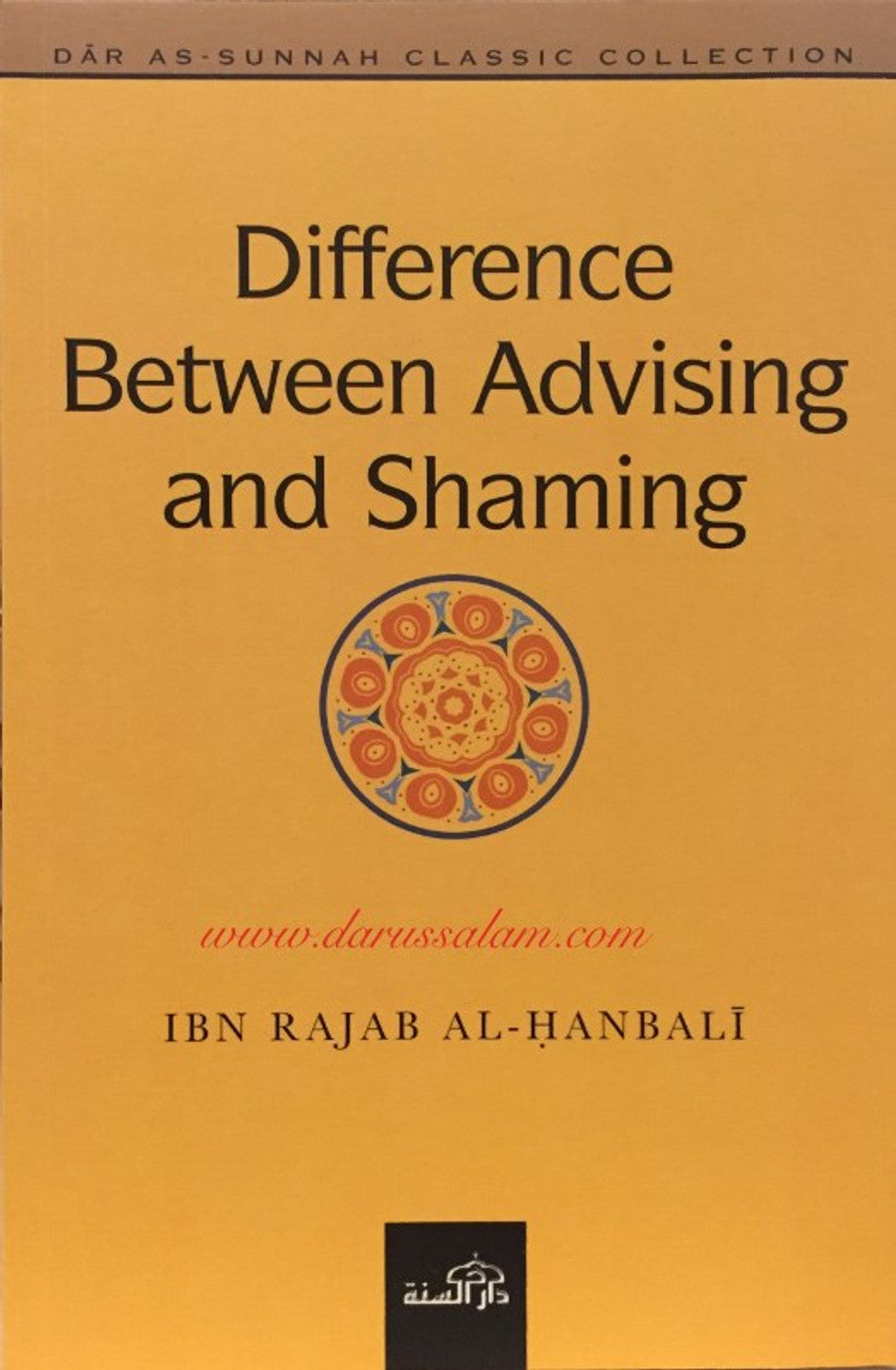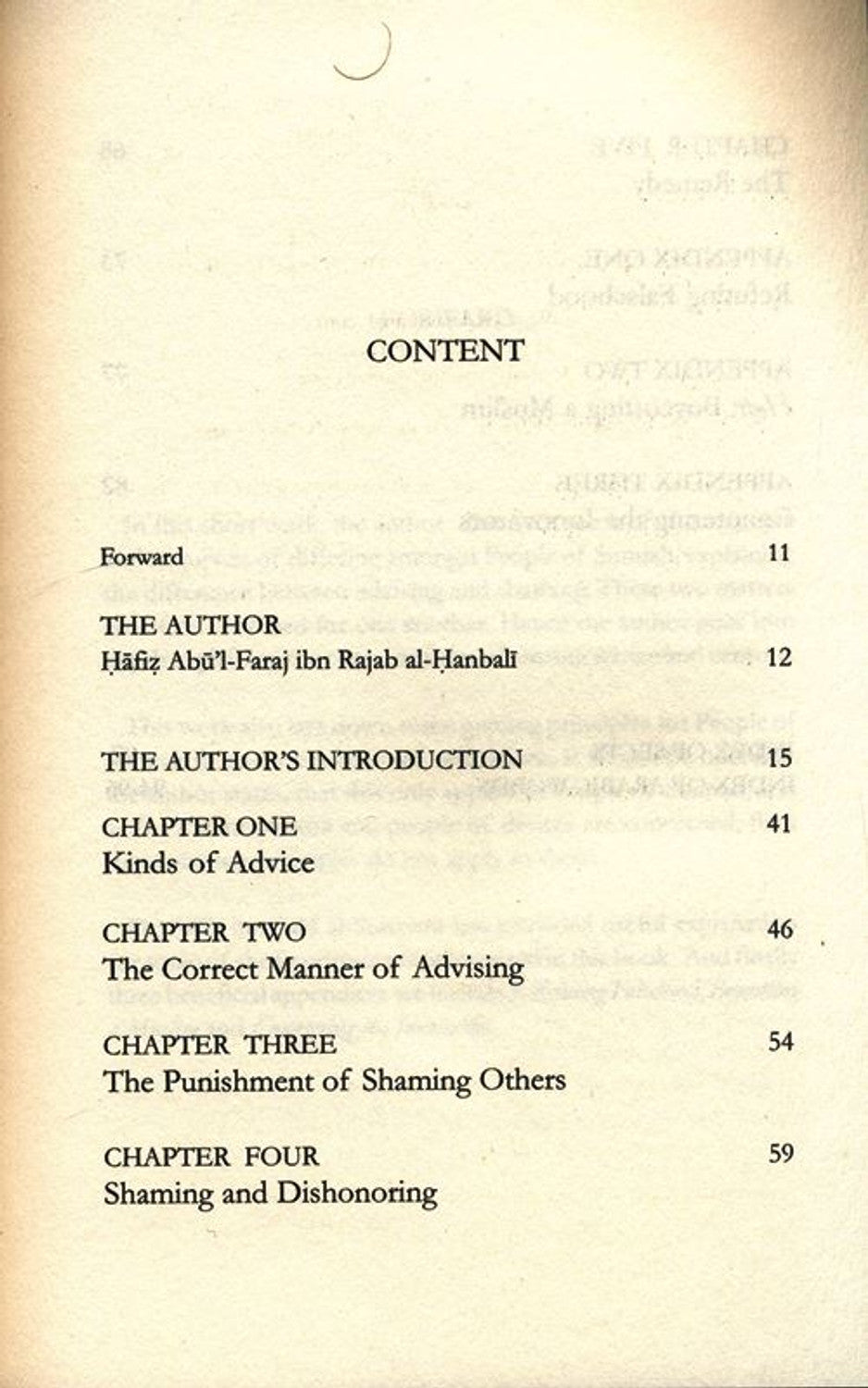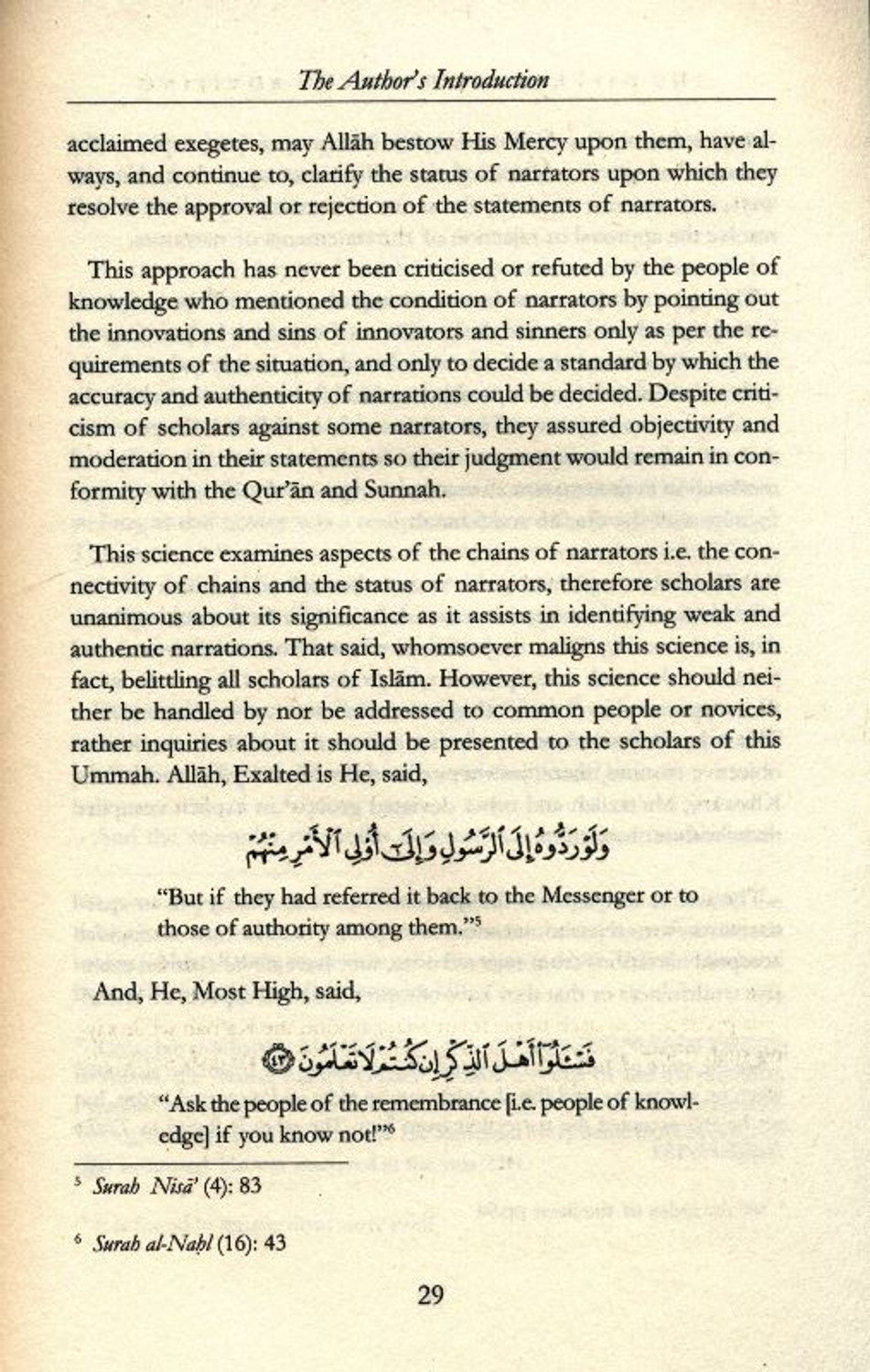Difference between Advising And Shaming
Difference between Advising And Shaming
Publisher:
Dar As Sunnah Publications
Author:
Ibn Rajab Al-Hanbali
Language:
English
Binding:
Soft Cover
Pages: 96
Size: A5 |5.8 x 8.3 in| 14.8x 21 cm
Couldn't load pickup availability



Collapsible content
Description of Book
In this notable work, the renowned author discusses key differences that arise between the People of Sunnah, highlighting the importance of acquiring manners and etiquette when dealing with disagreements. The author clearly distinguishes between advising, which is encouraged, and shaming, which is not permitted, two topics that are often misunderstood. The characteristics of sincere advice and censure are explained in depth, providing valuable insights for those involved in active da'wah. The book also lays down guiding principles for preparing criticisms and refutations, emphasizing that these are only applicable to the People of Sunnah and not to those who follow Innovation and desires. This is because the former group is known for seeking the truth, being merciful to others, and desiring guidance, reform, and all forms of goodness. They never intend harm, but instead strive to clarify truth through reasoning and dialogue, enjoining good and forbidding evil, and making the Word of Allah supreme. Dr. Salih ibn Sa`d al-Suhay
Publisher
Dar As Sunnah Publications
Author
- Ibn Rajab Al-Hanbali
Sample Pages - Content
Page : 01
DAR AS-SUNNAH CLASSIC COLLECTION Difference Between Advising and Shaming www.darussalam.com IBN RAJAB AL-HANBALĪ دار السنة
Page : 02
CONTENT ACC) Forward THE AUTHOR Hafiz Abu'l-Faraj ibn Rajab al-Hanbali bod p X OT THE AUTHOR'S INTRODUCTION CHAPTER ONE Kinds of Advice CHAPTER TWO The Correct Manner of Advising CHAPTER THREE The Punishment of Shaming Others CHAPTER FOUR Shaming and Dishonoring 11 121 15 19 41 46 54 59 59
Page : 03
The Author's Introduction acclaimed exegetes, may Allah bestow His Mercy upon them, have al- ways, and continue to, clarify the status of narrators upon which they resolve the approval or rejection of the statements of narrators. This approach has never been criticised or refuted by the people of knowledge who mentioned the condition of narrators by pointing out the innovations and sins of innovators and sinners only as per the re- quirements of the situation, and only to decide a standard by which the accuracy and authenticity of narrations could be decided. Despite criti- cism of scholars against some narrators, they assured objectivity and moderation in their statements so their judgment would remain in con- formity with the Qur'an and Sunnah. This science examines aspects of the chains of narrators i.e. the con- nectivity of chains and the status of narrators, therefore scholars are unanimous about its significance as it assists in identifying weak and authentic narrations. That said, whomsoever maligns this science is, in fact, belittling all scholars of Islam. However, this science should nei- ther be handled by nor be addressed to common people or novices, rather inquiries about it should be presented to the scholars of this Ummah. Allah, Exalted is He, said, وَلَوْ رَدُّوهُ إِلَى الرَّسُولِ وَإِلَى أُولِي الْأَمْرِ مِنْهُمْ "But if they had referred it back to the Messenger or to those of authority among them."5 And, He, Most High, said, فَسَلُوا أَهْلَ الذِكرِ إِن كُنتُمْ لَا تَعْلَمُونَ ) "Ask the people of the remembrance [i.e. people of knowl- edge] if you know not!" 5 Surah Nisa' (4): 83 6 Surah al-Nahl (16): 43 29 22
Page : 04
DIFFERENCE BETWEEN ADVISING AND SHAMING IBN RAJAB AL-HANBALI In this notable work, the renowned author provides essential detail in discussing key points dealing with differences that arise between the People of Sunnah, and the manners and etiquette one should acquire when differing occurs. He beautifully illustrates the difference between advising that is encouraged, and shaming that is not permitted - two topics that often become tangled and misunderstood. The author thus explains the characteristics of sincere advice and censure with a depth of clarity that will no doubt bring benefit to all, particularly those involved in active da'wah. This work also lays down some guiding principles when preparing criticisms and refutations. It makes clear that such ideal precepts apply to People of Sunnah; and as far as the People of Innovation and desires are concerned, then these principles do not apply to them. This is because the former group is recognised for following the truth, being merciful to the creation and desiring for them guidance, reform and all kinds of goodness. They never intend any harm, but rather make falsehood known by stemming ignorance through reasoning and dialogue in clarifying the truth - they enjoin the good and forbid the evil and strive in making the Word of Allah uppermost. Dr. Salih ibn Sa'd al-Suhaymi provides beneficial commentary for the important points covered in this book, bringing greater relevancy to our modern context. The addition of appendices is a welcome feature that contributes towards increased understanding of topics like, Refuting Falsehood, Boycotting a Muslim and Countering the Innovators. سنة Visit us www.darassunnah.com ISBN-13: 978-1-904336-04-2 ISBN-10: 1-904336-40-2 Dár as-Sunnah Publishers P.O. Box 9818, Birmingham, B11 4WA, United Kingdom. E-mail: info@darassunnah.com www.darassunnah.com Copyright by Dår as-Sunnah Publishers 9 781904 336402 > Price: UK £5.50 I USA $11.00
Who is Ibn Rajab Al-Hanbali?
Ibn Rajab al-Hanbali (1335–1393 CE) was a prominent Islamic scholar from the Hanbali school of jurisprudence, renowned for his deep knowledge of hadith, fiqh (Islamic jurisprudence), and Islamic spirituality. He is best known for his works on the virtues of the Islamic faith, such as Lata'if al-Ma'arif (The Subtle Blessings), which highlights the significance of Islamic holidays, acts of worship, and recommended practices. Ibn Rajab was also an expert in the science of hadith and authored works that discussed the lives and biographies of prominent scholars and the importance of piety and sincerity in worship. His scholarship continues to be highly regarded, especially for its emphasis on spirituality and ethical conduct.



